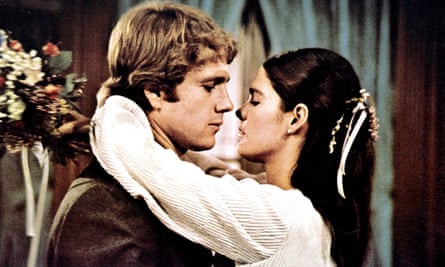The French composer Francis Lai, who has died aged 86, enjoyed a diverse career during which he composed the scores for more than 100 films, as well as working in radio and television and writing around 600 songs for many leading singers.
It was his score for the film Love Story (1970) that gave him his greatest success. Lai’s poignant piano melody mixed with windswept strings perfectly evoked the film’s tale of a grand passion tragically cut short, and it brought Lai an Oscar for best music, original score, in 1971 – the only one of the film’s seven nominations to win. He also carried off a Golden Globe for best original score. The soundtrack album made it to No 2 in the US chart, while the theme tune, retitled (Where Do I Begin?) Love Story and with lyrics by Carl Sigman, was a No 9 US hit for Andy Williams and reached No 4 in the UK. There was further chart success for orchestral recordings of the tune by Henry Mancini and Lai himself.
Initially Lai was going to turn down the Love Story assignment, but the French actor Alain Delon had seen an early screening of the film and persuaded him to postpone his summer holiday and work on the score instead. Delon and the producer Robert Evans took a copy of the film to Paris, and it moved the composer so much that, as he recalled, “I went straight home, sat at my keyboard and wrote the theme that very night.”
Lai was born in Nice, the son of two market gardeners. He attended the Lycée Saint-Philippe in Nice and, having learned both the piano and accordion, began his musical career in 1950 as an orchestral musician. In Marseille he met the popular singer Claude Goaty and became her accompanist, then moved with her to Paris. He lived in Montmartre in what the film director Claude Lelouch, with whom he would work on 35 films, described as little more than a caretaker’s lodge.
In the early 1960s Lai was accompanist for Édith Piaf, for whom he wrote the songs L’Homme de Berlin, C’etait Pas Moi and Les Gens, and he would go on to write material for a long list of performers including Mireille Mathieu, Petula Clark, Yves Montand, Johnny Hallyday, Françoise Hardy, Charles Aznavour, Nana Mouskouri and Jean-Paul Belmondo.
In 1970 Elton John recorded Lai’s song From Denver to LA for the soundtrack of Michael Winner’s film The Games. It was released as a single but was quickly withdrawn after objections from John’s record company, “so if you have a copy, it’s worth a small fortune,” as John pointed out. With the lyricist Rod McKuen, Lai wrote Perry Como’s 1971 hit I Think of You.

Lai made his debut in film in 1964 when he wrote music for Roger Vadim’s La Ronde, and in 1966 he scored Jean-Luc Godard’s Masculin Féminin.
Also that year he worked on Lelouch’s Un Homme et Une Femme (A Man and a Woman), an international hit that earned his score an Oscar nomination and two Golden Globes, plus the Palme d’Or at the 1966 Cannes film festival. Lai’s lilting theme tune, with its distinctive “chabadabada” vocals, was an instant easy-listening classic and was covered numerous times, including in a version with English lyrics by Engelbert Humperdinck on his album A Man Without Love (1968).
Lai continued to collaborate regularly with Lelouch, covering many musical styles, notably in Le Bon et les Méchants (The Good and the Bad, 1976), which featured a 1940s-style score that referenced Glenn Miller, while Smic, Smac, Smoc (1971) found Lai on screen as a blind accordionist playing the film’s theme tune.
At the time of his death he was working on a third instalment of Un Homme et Une Femme, once again featuring the original stars Anouk Aimée and Jean-Louis Trintignant. “I’m sad that he was never able to see it,” said Lelouch, who considered Lai “le plus grand mélodiste français”.
Lai was in demand with many other directors. He worked on Winner’s I’ll Never Forget What’s’isname (1967), Terence Young’s Mayerling (1968), Peter Hall’s Three Into Two Won’t Go (1969), Rene Clément’s Rider On the Rain (1970) and Bryan Forbes’s International Velvet (1978). He also ventured into soft-core erotica with Francis Giacobetti’s Emmanuelle II (1975) and David Hamilton’s Bilitis (1977).
His work for television included electronic compositions, featuring synthesisers and ondes martenot, for France’s FR3 network. For American TV he created music for the movie Berlin Affair (1970) and the miniseries Sins (1986), for which he co-wrote It’s Hard to Be Tender with Carly Simon, who sang it.
He is survived by his wife, Dagmar Puetz, and their two children.

Comments (…)
Sign in or create your Guardian account to join the discussion